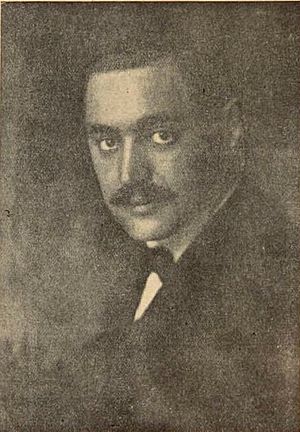Diego Dublé Urrutia facts for kids
Diego Dublé Urrutia was a talented Chilean poet, painter, and diplomat. He was born in Angol, Chile, on July 8, 1877, and passed away in the same city on November 13, 1967. He was honored with the Chilean National Prize for Literature in 1958.
Early Life and School
Diego Dublé Urrutia was the son of Teodorinda Urrutia Anguita and Baldomero Dublé Almeida. His father was an engineer and a soldier in the Chilean Army. Sadly, his father died in a battle during the War of the Pacific in 1881. Diego's grandfather, Basilio Urrutia, was also a military officer.
Diego went to several schools, including Santiago College in Angol. Later, he moved to Santiago to finish his studies at the National Institute.
When he was 18, in 1895, he received a special mention for his poetry. His collection of poems was called "Pensamientos en la tarde" (Afternoon Reflections).
In 1897, he trained to become an officer in the Artillery Regiment. He also studied law at the University of Chile. During this time, he wrote for newspapers like La Ley de Santiago and El Sur de Concepción. He used the pen name "The Ripper."
His Career as a Diplomat and Poet
Diego Dublé Urrutia joined the Chilean diplomatic service. This meant he worked for his country in other parts of the world.
In 1898, he published a book of poems called Veinte años (Twenty Years). This book included the poems from his earlier work, "Pensamientos en la tarde."
In 1903, he released another popular book, Del mar a la montaña (From the Sea to the Mountain). It was first published in Santiago and then in Paris. Famous poets praised his work. José Santos Chocano told him, "You are the poet of Chile." Rubén Darío, a very important poet from Nicaragua, wrote that Chile had found its poet in him. The Chilean writer Hernán Díaz Arrieta, also known as Alone, said that From the Sea to the Mountain made him a top Chilean poet.
Also in 1903, Diego began his diplomatic journey in France. This was the first of 17 countries where he worked. He served in places like Austria, Italy, and Brazil. In Ecuador, he was Chile's main representative. His travels allowed him to meet and become friends with many famous writers and artists. These included Paul Claudel, Maurice Maeterlinck, and Anatole France.
Around 1917, his poems were included in a collection called Selva Lirica. He also helped start a group called Los Diez (The Ten). This group included writers, composers, artists, and architects. Some other members were Pedro Prado, Manuel Magallanes Moure, and Juan Francisco González.
Diego wrote about his religious beliefs in Profesión de fe (Profession of Faith, 1928). He also wrote about his family history in Memoria genealógica de la familia Dublé (Genealogical Memory of the Dublé Family, 1942). After a long break, he published Fontana candida in 1953. This book was a big collection of all his poetry, including new works.
He passed away on November 13, 1967. A full collection of his poetry was published in 1997. It was also titled Del mar a la montaña.
Awards and Recognition
Diego Dublé Urrutia was a member of the Chilean Academy of Language. This is a special group that works to protect and promote the Spanish language in Chile.
In 1958, he received the National Literature Prize. This is one of the highest honors for a writer in Chile.
See also
 In Spanish: Diego Dublé Urrutia para niños
In Spanish: Diego Dublé Urrutia para niños
 | Janet Taylor Pickett |
 | Synthia Saint James |
 | Howardena Pindell |
 | Faith Ringgold |


